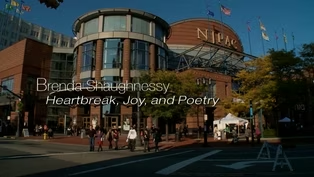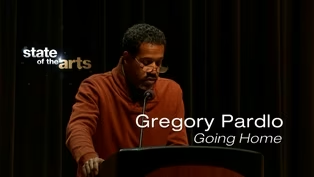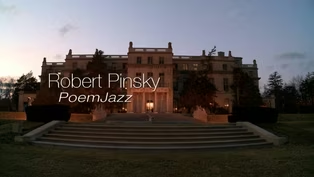State of the Arts
Poet Stephen Dunn
Clip: Season 41 Episode 7 | 6m 10sVideo has Closed Captions
Pulitzer Prize-winning poet Stephen Dunn returns to Stockton University.
Poet Stephen Dunn taught at Stockton University for decades. Producer Eric Schultz spent the day with the Pulitzer Prize-winner in Western Maryland where he had retired. Stephen reflected on his unlikely career as a poet—there were no artists or writers in his family and his dream as a young man was to play basketball.
Problems playing video? | Closed Captioning Feedback
Problems playing video? | Closed Captioning Feedback
State of the Arts is a local public television program presented by NJ PBS
State of the Arts
Poet Stephen Dunn
Clip: Season 41 Episode 7 | 6m 10sVideo has Closed Captions
Poet Stephen Dunn taught at Stockton University for decades. Producer Eric Schultz spent the day with the Pulitzer Prize-winner in Western Maryland where he had retired. Stephen reflected on his unlikely career as a poet—there were no artists or writers in his family and his dream as a young man was to play basketball.
Problems playing video? | Closed Captioning Feedback
How to Watch State of the Arts
State of the Arts is available to stream on pbs.org and the free PBS App, available on iPhone, Apple TV, Android TV, Android smartphones, Amazon Fire TV, Amazon Fire Tablet, Roku, Samsung Smart TV, and Vizio.
Providing Support for PBS.org
Learn Moreabout PBS online sponsorshipDunn: An education.
"For a while you believe by putting just one phrase on paper or a splash of paint on a canvas, a gesture, random and accidental.
You were on your way to the beginning of an order."
Narrator: Outwardly, there was little in his early life to suggest that Stephen Dunn would become one of America's great poets, a Pulitzer Prize winner and a much loved teacher.
But that's what happened.
The New York native attended Hofstra University on a basketball scholarship, was the first in his family to graduate from college and played pro ball for a year.
Then he became an advertising man.
Dunn: My case is so much different than anybody else's.
I didn't have any teachers that taught me poetry in any successful way.
I had no devotion to anything except playing ball.
But I was a serious reader.
I had read all the great books by the time I was 20 it seemed.
My first job after college, after I played a year of basketball, was with National Biscuit Company, in which I answered an ad in the New York Times for a writer.
I was good at it.
Actually, getting promoted terrified me.
Narrator: So Stephen quit the corporate world and went to Spain for a year.
Dunn: Went to write a novel, and wrote a bad novel, threw it away.
And my only literary friend, Sam Takara, came over to Spain to visit, and he confirmed that the poetry I was writing, that I started to write then was good.
If he hadn't done that, I might not have continued.
The professor emeritus at Stockton University is the author of more than a dozen volumes of poetry, and his poems appear in magazines like "The New Yorker."
The poet married writer and essayist Barbara Hurd in 2003 and moved from New Jersey to Frostburg, Maryland, where she was teaching.
Hurd: I had taught his work for years and admired his work and that contrarian mind that he has.
Dunn: "After I asked about their souls, they laughed and stumbled toward an answer, then gave up, turning the question back to me.
Because mine was always in jeopardy.
I said it went to the movies and hasn't been seen since."
[ Laughter ] [ Applause ] Narrator: For more than 20 years, Stephen Dunn has led seminars at the annual Murphy Writing Retreat, now held at the Stockton Seaview Hotel.
Hurd: For him whom it feels like a community of people that have been on this poetry ride with him for a long time.
Murphy: He loves teaching, but he says, in our class, what we teach at Stockton is it's hard to write a good poem.
I'm not sure any of you can write a good poem, and by the end of the semester, it's like, you know, some of you wrote some good poems.
Dunn: Ona has a difficult time writing a bad poem.
[ Laughter ] And this is -- this is a good poem.
But one of the things that makes it for me is -- is the cooperative sounds, your ends and your ends.
Murphy: And his poems are accessible.
You can read a Stephen Dunn poem and get it.
Dunn: I'm often called an honest poet.
I never think of myself that way.
I think honesty is an achievement, if you're lucky.
Murphy: Stephen loves to play with contraries, so that he might have a poem about a relationship, let's say, between a husband and wife.
And you're expecting it to go one way, but it turns in a different way.
Narrator: At home in Frostburg, Stephen Dunn chose to read a poem called "Propositions" from his recent collection, "Whereas."
It includes the line, "Before I asked my wife to marry me, I told her I'd never be fully honest."
And it concludes with a line that he says completely surprised him when he wrote it.
Hurd: It was a poem that came out of a conversation, actually, that we did have at some point, and it was related to this conversation of honesty being an achievement and not not something you just blurt out because that's what you're thinking at the time, that that's not necessarily honest at all.
But, you know, to be digging deeper for what is really honest.
"Propositions."
"What does a pig know about bacon?
Anyone who begins a sentence with 'In all honesty' is about to tell a lie.
Anyone who says 'This is how I feel' has better love form more than disclosure.
Same for anyone who thinks he thinks well, because he has thought.
If you say you're ugly to an ugly person, no credit for honest, which must always be a discovery, an act that qualifies as an achievement.
If you persist, you're just a cruel bastard, a pig without a mirror, somebody who hasn't examined himself enough.
A hesitation hints an attempt to be honest, suggests a difficulty is present.
A good sentence needs a clause or two, interruptions, set off by commas, evidence of slowing down or rethinking.
Before I asked my wife to marry me, I told her I'd never be fully honest.
No one, she said, had ever said that to her.
I was trying to be radically honest, I said, but in fact had another motive.
A claim without a 'but' in it is, at best, only half true.
In all honesty, I was asking in advance to be forgiven.
[ Music plays ]
Video has Closed Captions
Clip: S41 Ep7 | 6m 47s | Poet Brenda Shaughnessy at the Dodge Poetry Festival and at Rutgers University-Newark. (6m 47s)
Video has Closed Captions
Clip: S41 Ep7 | 3m 31s | Pulitzer Prize-winner Gregory Pardlo, poet, returns to to his hometown in New Jersey. (3m 31s)
Video has Closed Captions
Clip: S41 Ep7 | 5m 39s | Meet two-time US Poet Laureate Robert Pinsky in his hometown of Long Branch, NJ. (5m 39s)
Providing Support for PBS.org
Learn Moreabout PBS online sponsorship

- Arts and Music
The Best of the Joy of Painting with Bob Ross
A pop icon, Bob Ross offers soothing words of wisdom as he paints captivating landscapes.












Support for PBS provided by:
State of the Arts is a local public television program presented by NJ PBS



